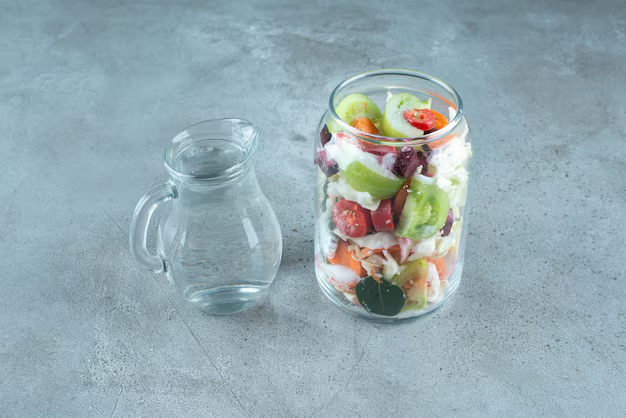How Long Do Pickles Really Last in the Refrigerator?
Pickles, with their tangy, crunchy flair, are a beloved staple in many households across the globe. Whether enjoyed on a sandwich, burger, or on their own, they bring a zesty punch to countless dishes. Yet, a common question persists among pickle enthusiasts: how long do pickles really last in the refrigerator? This article not only seeks to answer that question but delves into various facets of pickle storage to ensure you're enjoying them at their peak flavor and safety.
📦 Understanding Pickle Preservation Basics
Before diving into the specifics of shelf life, it's crucial to understand the basics of pickle preservation. Pickles are essentially preserved cucumbers or other vegetables stored in a solution of brine, vinegar, and spices. This acidic environment is what helps keep them preserved longer than fresh cucumbers.
The Role of Acidity
- Acidity in pickles acts as a natural preservative.
- Vinegar maintaining a low pH, inhibits the growth of spoilage-causing bacteria.
Two Types of Pickles
- Refrigerated Pickles: These are fresh pickles stored immediately in the fridge. They have a fresher taste but a shorter shelf life.
- Shelf-Stable Pickles: Canned and sealed for pantry storage, they can be kept longer even before refrigeration.
🕰️ Shelf Life of Pickles in the Refrigerator
Determining how long pickles last in the fridge depends on several factors. Here's a closer look at their shelf life under optimal storage conditions:
Unopened Pickles
- Unopened jars of pickles can last in the fridge up to two years, thanks to the sealed environment that prevents contamination.
- Use the "best by" or "use by" date as a key indicator, but remember this guidance typically refers to quality, not safety.
Opened Pickles
Once opened, pickles are exposed to the elements and their shelf life decreases:
- Refrigerated Pickles: Last about one to two months once opened.
- Shelf-Stable Pickles: Are good for up to two to three months in the fridge after opening.
Homemade Pickles
- Homemade varieties offer more customization, but generally last four to six weeks since they might lack preservatives found in commercial options.
🌡️ Best Practices for Storing Pickles
Even though pickles are preserved, proper storage still plays a huge role in maintaining their flavor and safety. Here are some useful strategies:
Keep Them Covered
- Ensure that pickles stay submerged in their brine to prolong freshness and prevent mold growth.
Optimal Temperature
- Store pickles at consistent, cold temperatures. The ideal range is 34 to 40°F, typical of your refrigerator setup.
Use Clean Utensils
- Avoid using fingers or unclean utensils when fetching pickles from the jar to prevent introducing bacteria.
🥒 Identifying Spoiled Pickles
Knowing when to discard pickles is crucial to enjoy them safely. Spoiled pickles typically show specific signs:
Signs of Spoilage
- Off Smell: A sour smell different from the usual vinegar aroma.
- Color Changes: Darkening or losing coloration.
- Texture: Mushy or slimy casting.
- Mold Growth: White or green fuzz on the surface or in the brine.
If any of these signs are evident, it's best to err on the side of caution and discard the container.
🛡️ Tips for Extending Pickle Life
While pickles naturally have a long shelf life, here are some ways to ensure they last even longer:
Use Sterilized Jars
- If you're making your own, always use sterilized jars to reduce contamination risk.
Consume in Moderation
- Avoid double-dipping and exposing the brine to air frequently, which can speed up degradation.
Seal Tightly
- Always ensure jar lids are sealed properly to maintain the crunchy texture.
🍽️ Culinary Uses for Aging Pickles
Even if your pickles have been sitting in the fridge for a while, there are creative ways to revitalize them in meals:
Pickle Relish
- Dice aging pickles and mix them with mustard and herbs for a homemade relish, perfect for hot dogs and sandwiches.
Flavorful Brine
- Use pickle brine for marinades or salad dressings. It adds a zesty kick that transforms ordinary recipes.
📋 Visual Summary: Quick Pickle Care Tips
Here's a quick reference to ensure the longevity and quality of your pickles:
- Check Dates: Use within timelines for opened and unopened jars.
- Storage: Keep jars closed tightly and use clean utensils.
- Temperature: Consistent refrigeration around 34-40°F.
- Spoilage: Be vigilant about smell, color, and texture changes.
- Creative Uses: Don’t let older pickles go to waste – incorporate them into relishes or vinaigrettes.
By understanding these intricacies and implementing the recommendations provided, you'll not only prolong the life of your pickles but ensure they remain safe and delectable every time you reach for that jar. So, next time you munch on a crisp pickle spear, you'll do so with the satisfaction of knowing it's fresh, safe, and delicious.

